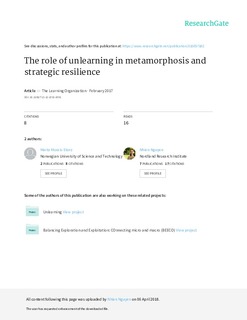| dc.description.abstract | Purpose: This paper aims to: (1) conceptualize what it means to be resilient in the face of our current reality of indisputable turbulence and uncertainty, (2) suggest that continual metamorphosis is key to resilience, (3) demonstrate the role of unlearning in that metamorphosis, and 4) suggest that problem formulation is a key deliberate mechanism of driving continual cycles of learning and unlearning. Design/methodology/approach: The paper entails a conceptual analysis. Findings: It is found that both the unlearning and resilience literature streams are stuck in a paradigm whereby organizational behavior entails adaptation to the external environment and reaction to crisis. This paper suggests that, given a world of turbulence and uncertainty, a more useful paradigm is one where organizations take action before action is desperately needed, and that they proactively contribute to enacting their environment via their own continual metamorphosis. Research limitations/implications: Future research should explore further the factors that can (1) facilitate sensing the early warning signs, and (2) facilitate the cyclical learning-unlearning process of metamorphosis. Practical implications: The primary practical implication is that in order to assure strategic resilience managers must be able to identify early-warning signs and initiate metamorphosis. This means understanding the processes needed to support unlearning, namely, problem formulation. Originality/value: The originality and value of the present paper lies in that it suggests a shift in paradigm from adaptation and reaction, to action and enactment. Further, it proposes a cyclical process of learning and unlearning that together define periods of metamorphosis, and suggests problem formulation, whereby the mission statement is assessed and revised, as a mechanism in that endeavor. | nb_NO |
